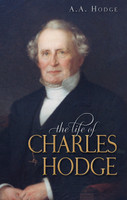
Hodge, Archibald A.
Charles Hodge (1797–1878) is regarded by many as the most significant American theologian of the nineteenth century. He drove forward the rapid growth of theological education and contributed to Presbyterianism's wide-ranging influence in public life. His advocacy of a Reformed orthodoxy combined with evangelical piety attracted a broad following within Old School Presbyterianism that spilled over into American evangelicalism as a whole. Hodge helped to define a distinctive ministerial model—the pastor-scholar—and his fingerprints can be seen all over the Reformed Christian scene of today.
Table of Contents:
Part 1: Roots
1. New Side Confessionalist
2. Early Religious Experience
3. From Philadelphia to the College of New Jersey
4. Following the Plan
5. Fledgling Ministry
6. Expanding Vistas
7. Fledgling Professor
Part 2: Broadened Abroad
8. Separation from Family
9. Maintaining Family Connections
10. Student, Conversationalist, Cultural and Ecclesiastical Observer
11. Berlin – The Reigning Center of Nineteenth-Century German Culture
12. A New Model in Theological Education
13. Assessing the Sojourn in Europe
Part 3: Moderate Old School Presbyterian
14. Newfound Confidence
15. A Prodigious Journalistic Venture
16. Old School-New School Rivalry
17. Old School Nurture vs. New School Revivalism
18. Abolitionism vs. Gradual Elimination of Slavery
19. Schism of 1837
20. Revisionist Historian
21. To Publish or Not to Publish
Part 4: Old School Controversialist and Churchman
22. Changes
23. An Evangelical Theology
24. Christian Education
25. Relations with Roman Catholicism
26. Internecine Controversy: Mercersburg
27. Old School North vs. Old School South
28. Subscription to the Westminster Confession of Faith
Part 5: interaction with Europe
29. Anglicanism’s Oxford Movement
30. German and American Transcendentalism
31. Revisiting an Old Friend
Part 6: Mature Presbyterian Theologian
32. A Nation and Church Divided and Reunited
33. Reformed among Evangelicals
34. Science under Scrutiny
35. Fifty Years and Counting
Author
W. Andrew Hoffecker (M.Div., Gordon-Conwell Theological Seminary; Ph.D. Brown University) currently serves as Professor of Church History at Reformed Theological Seminary
Endorsements
“A many-sided theologian demands a many-sided biography, which is exactly what Andrew Hoffecker has provided in this careful, balanced, discerning, and insightful book. Although the volume offers an unusually full treatment of the unusually full life of Charles Hodge, who is universally recognized as one of the leading American theologians of the nineteenth century, Hoffecker also has an argument to make. The argument is that in his long career as the mainstay of Princeton Theological Seminary, Hodge successfully combined a strong commitment to confessional Reformed theology and a winsome practice of humble evangelical piety...Hoffecker’s life of Hodge demonstrates conclusively that any fair reading of Hodge must recognize at least three things: a full and well-rounded life of steadfast Christian devotion, a more- than-capable advocacy of classical Calvinist doctrines such as universal original sin and the substitutionary atonement, and a set of intellectual instincts commonplace among Americans in the first two-thirds of the nineteenth century.” — Mark A. Noll, Francis A. McAnaney Professor of History, University of Notre Dame
"Charles Hodge has for too long been victimized by stereotypes. In this fine biography, Andy Hoffecker sets the record straight. Here we meet Hodge the careful Reformed thinker who nurtured a deep piety. This book gives us a winsome portrait of a theologian who still deserves to be taken with utmost seriousness.” — Richard Mouw, President, Fuller Theological Seminary
"Andrew Hoffecker’s biography of Charles Hodge is a wonderfully entertaining and informative read. Hodge is one of the historic giants of Presbyterianism, combining the virtues of scholarship, churchmanship, and a delightful personality. For those who may have read some of his writings but know little of the man and the professional triumphs and personal tragedies he faced, this book will be a great introduction. To those already familiar with Hodge’s life, this book will be welcomed as a twice-told tale that will reinvigorate their interest in the man and his work, and set before them an example to be emulated. Andrew Hoffecker has perhaps done as much as anyone to make Old Princeton attractive to a new generation, and this new work is surely a worthy capstone to his career." — Carl R. Trueman, Professor of Historical Theology and Church History, Westminster Theological Seminary, Philadelphia